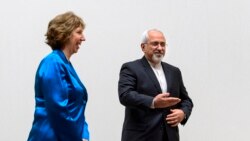GENEVA, SWITZERLAND —
Negotiators say two days of nuclear talks in Geneva between Iran's new government and the United Nations contact group achieved new levels of specificity and openness. They will not reveal details, however, and say much work remains.
It was another day of diplomatic convoys crossing the city. But unlike in past talks, there appeared to be real progress. Not least was a rare joint statement, read by the European Union's foreign policy chief Catherine Ashton.
“The foreign minister of the Islamic Republic of Iran presented an outline of a plan as a proposed basis for negotiation which is being carefully considered by the E 3+3 [P5+1] as an important contribution. Members of delegations followed with in-depth, bilateral and joint consultations on various elements of the approach,” she said.
Ashton said these were the most detailed discussions among a series of meetings she has attended over the last three years.
She and her Iranian counterpart, Mohammed Javad Zarif, declined to give specifics on key topics in the talks, including Iran's stockpile of uranium enriched to near weapons grade, its continuing enrichment program and its desire for relief from international sanctions that have battered its economy.
The diplomats said their silence is proof the talks are serious.
Zarif said the meetings were “extensive and fruitful,” and he hopes they mark the start of a new phase in Iran's international relations that will end what he called an “unnecessary crisis.”
“There are more important issues that we need to deal with. And the right of Iran to pursue nuclear technology for peaceful purposes, including enrichment, can in fact be exercised, with the necessary political will, without any proliferation concerns. And that is what we are going to move forward and achieve in my view," said Zarif.
But amid the optimism, both sides emphasized there still are disagreements on many points, and that the issues are complex and technical. Zarif called this the first step on a difficult road, and he said the journey will take time.
It was another day of diplomatic convoys crossing the city. But unlike in past talks, there appeared to be real progress. Not least was a rare joint statement, read by the European Union's foreign policy chief Catherine Ashton.
“The foreign minister of the Islamic Republic of Iran presented an outline of a plan as a proposed basis for negotiation which is being carefully considered by the E 3+3 [P5+1] as an important contribution. Members of delegations followed with in-depth, bilateral and joint consultations on various elements of the approach,” she said.
Ashton said these were the most detailed discussions among a series of meetings she has attended over the last three years.
She and her Iranian counterpart, Mohammed Javad Zarif, declined to give specifics on key topics in the talks, including Iran's stockpile of uranium enriched to near weapons grade, its continuing enrichment program and its desire for relief from international sanctions that have battered its economy.
The diplomats said their silence is proof the talks are serious.
Zarif said the meetings were “extensive and fruitful,” and he hopes they mark the start of a new phase in Iran's international relations that will end what he called an “unnecessary crisis.”
“There are more important issues that we need to deal with. And the right of Iran to pursue nuclear technology for peaceful purposes, including enrichment, can in fact be exercised, with the necessary political will, without any proliferation concerns. And that is what we are going to move forward and achieve in my view," said Zarif.
But amid the optimism, both sides emphasized there still are disagreements on many points, and that the issues are complex and technical. Zarif called this the first step on a difficult road, and he said the journey will take time.





